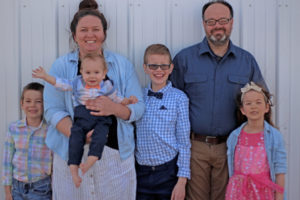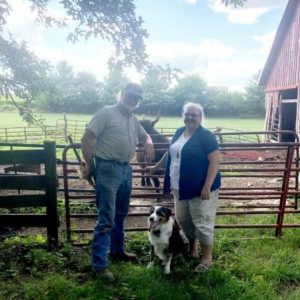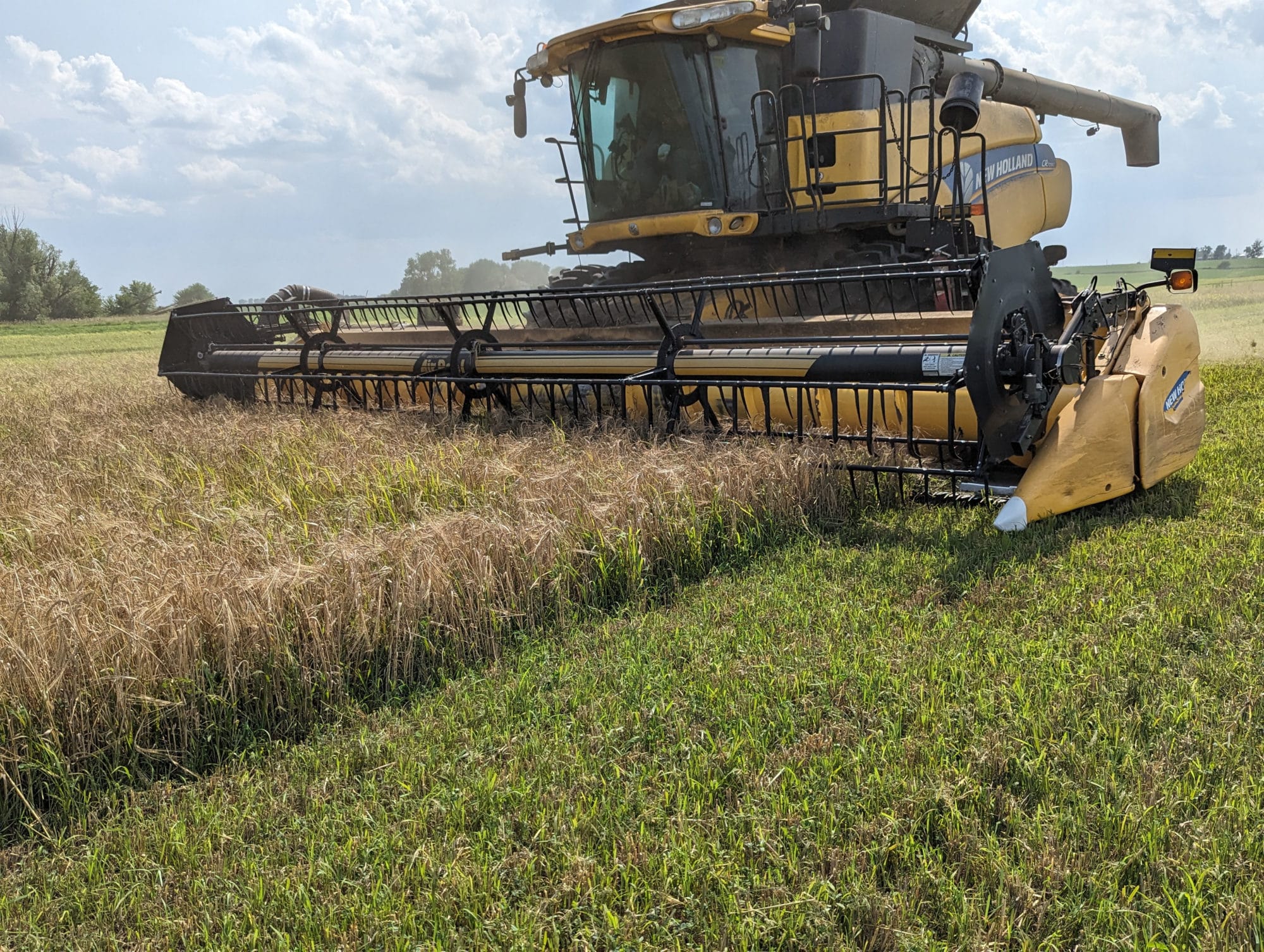Ventures in Organic
When Andrew Miller decided four years ago to transition his southwest Iowa farm to organic, he was motivated by a desire to restore his soils and farm according to regenerative practices. A fifth-generation farmer, Andrew began farming conventionally in 2014, raising mainly corn and soybeans on 800 acres of gently rolling hills near Silver City, Iowa, just east of the Loess Hills about 20 minutes from Council Bluffs.
Farming with synthetic chemicals and inputs was the norm in his area. When he started farming, Andrew followed the practices he had learned – but he was constantly asking questions and seeking ways to improve. Inspired by his wife, Jelyn Miller, who has a background in healthcare and believed organic practices resulted in healthier soil, food and people, his questions about farming practices expanded and deepened.
This inquiry led to their decision to start transitioning land to organic. “One of my goals is to do whatever we can that’s within economic reason to make [the farm] more sustainable,” Andrew says. “I want to leave it better than I found it.”
Today, he and Jelyn raise a diversity of crops and livestock at A. Miller Farms, LLC, including corn, soybeans, oats and field peas; alfalfa; cattle, chickens, geese and rabbits; and pigs and goats for homestead use. They’re also working towards producing an identity-preserved organic oatmeal in the coming year, a process that ensures the crop’s unique traits are verified and traceable back to their farm. The Millers, still in the process of transitioning to organic, are working with MOSA Certified Organic to transition the farm field by field. As of the 2023 season, they have certified organic oats, cereal rye and alfalfa, which comprise about 30% of their total acres.
“I don’t have a firm rotation,” Andrew says, “but being able to incorporate small grains is critical in breaking up weed, pest and disease cycles.”
Andrew notes that the organic transition process was eased somewhat by the fact that alfalfa, a low-input crop that can also help reduce the weed seed bank, had been part of the farm’s rotation for a generation. This hasn’t eliminated the challenges of switching to organic – he’s had to learn and experiment with other management practices. But he acknowledges how being familiar with alfalfa simplified the process a little, both logistically and economically.
He also knows there are other economic benefits to going organic, such as having more control over input costs and adding value to his crops with the certified-organic label. But he’s driven primarily by a desire to steward the land inherited from his settler great-grandfather. Switching to organic, Andrew says, pushes him “to use an ecologically driven systems approach to maintain plant and soil health rather than rely on rescue treatments when things go awry.”
Buoyed by Supportive Networks
Roughly 225 miles straight east of the Millers’ farm, in Iowa’s southeast corner, lifetime PFI members Gayle and Jeff Olson have been organically farming for about 15 years. Their Winfield farm includes organic small grains, alfalfa, corn, soybeans and cattle on a portion of their 1,300 acres. Early PFI members, their interest in ridge-till led them to join PFI in 1989, and they quickly became rooted in a supportive network of farmers willing to share both challenges and successes.
Jeff served on PFI’s board of directors for much of his and Gayle’s first decade as PFI members, and they got to know members with varying levels of organic farming experience. Steeped in that culture, the Olsons spent some years learning about organic from these farmers. Gayle also recounts one notable experience “seeing the rich quality of soil on organically farmed land.” She and Jeff decided to start transitioning some of their own land to organic, and they have been certified through Iowa Department of Agriculture and Land Stewardship for the past 12 years, following their initial three-year transition.
Like the Millers, the challenges of organic transition for Gayle and Jeff were similarly eased by practices already in place on their farm. Alongside a cohort of other farmers in their area, they had previously chosen to certify their farm with the International Organization for Standardization. While ISO certification differs from organic, both processes require detailed record-keeping and an annual inspection or audit. Familiarity with how to do that paid off when the Olsons decided to venture into organics.
They were also used to keeping separate storage for 50-50 crop share rental agreements with multiple landlords, and to separate various specialty crops they were trying out – like non-GMO beans and corn, blue corn and high-starch corn, among others. Knowing how to ensure those specialty crops didn’t mix meant they were prepared to keep their organic and conventional crops separate after harvest.
“Sometimes people don’t realize that it’s not just a three-year process to transition your land to organic. It takes different management and bookkeeping practices,” Gayle says. “If you’re learning all that at the same time, it can be overwhelming. That was a big advantage we had – we didn’t have to learn it all at the same time.”
While the Olsons are now more seasoned organic farmers, Gayle says PFI has remained a key source of support during the different stages of their organic farming experience. But she notes that more resources are available today than in the past. “I think there are more people around who are doing things with organic now than there were 15 years ago,” she says. “More people you can call on and ask for advice.”
Andrew agrees that PFI has been important during his transition process. As a newer generation transitioning to organic, he has also benefitted from easy access to other online resources that were less available to the Olsons in their early years.
“I’ve gained knowledge through PFI’s field days, webinars and email discussion groups, and have found many resources through the Rodale Institute,” Andrew says, referring to the nonprofit dedicated to organic research, training and education. He has also found social media, specifically various Facebook groups, to be a helpful space to connect with farmers and learn from their experiences.
A Change of Mindset
Despite the spread of organic farms, both the Olsons and the Millers are no strangers to criticism. On one side of the spectrum, Gayle says organic growers “are often looked upon as less-than and not as up-to-date.” On the other end, they face pressure to have a 100% organic operation. “Some people just treat organics as the only way to go,” Jeff says. “And we would like to be doing that, but we don’t have enough people and farmers to do it right.”
Andrew has had a similar experience. “[Organic] means so much to so many people,” he says. “Some look at you like you’re crazy, and then there are people that say ‘wow, that’s really cool.’”
Some of the doubt comes from the farmers themselves – many thinking of going organic worry about potentially negative changes to the land and crops. Andrew, however, argues those doubts can be overcome with a change in perspective. “The biggest change is probably within my own mindset,” he says. ”How I look to solve problems, how I understand nutrient cycling and how I better understand synthetics and their effects on the soil.”
He adds that the process of transitioning some of his land to organic and learning how to manage it has pushed him to become a better farmer in his conventional production practices as well. Gayle echoes that sentiment. “We have way too many chemicals in our world that we don’t understand well enough – on their own, let alone in combination with others,” she says. “Contributing as little to that as possible I think is a good thing.”
Andrew sees organic farming as an opportunity to experiment, learn and grow alongside the crops. “It used to be that I would go out and plant, spray, combine and then be done,” he says. With a chuckle, he adds, “It’s kind of fun to break up the monotony. I wanted to make farming fun again!”
Interested in transitioning your land to organic?
Here are some helpful resources to check out!
- Marbleseed
- Rodale Institute
- Iowa Organic Association
- ISU Organic Ag Program
- Organic Transition Initiative
- MOSA Organic
- Organic Grain Resource and Information Network (OGRAIN)
- Your local university agriculture program
These are just a few resources. Contact any of them or Practical Farmers of Iowa to learn about others.



